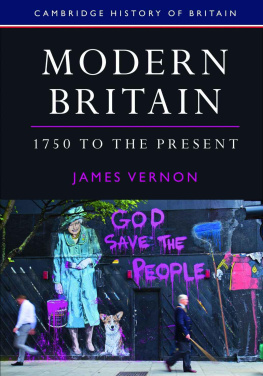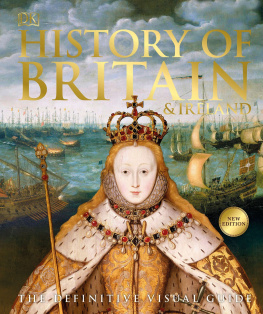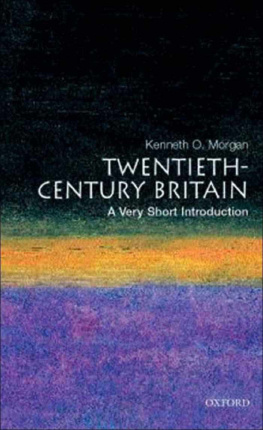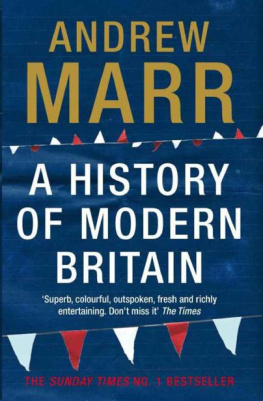Modern Britain
Admirable balance, allowing the reader to see the issues involved and draw informed conclusions extremely competently done and wholly reliable as a source of information.
Sidney Pollard, University of Sheffield
Modern Britain focuses on two major periods of British history; the interwar period and postwar Britain. The authors compare and contrast developments in the two periods, dealing with the themes of:
growth and welfare
industry
labour
social policy
the economy
Combining a narrative with a conceptual and analytic approach, Modern Britain provides an end-of-century review of progress and decline, and an essential background to current polemics and major issues of concern. Clearly structured and written, this is an invaluable textbook for students of twentieth-century British history.
Sean Glynn is a Senior Research Fellow at London Guildhall University. He is the author of Interwar Britain (1976) and several other books on modem economic history. Alan Booth is Senior Lecturer in Economic History at the University of Exeter. He is the author of British Economic Policy 1931-1949 (1989) and co-editor with Sean Glynn of The Road to Full Employment (1986).
Modern Britain
An economic and social history
Sean Glynn and Alan Booth
First published 1996
by Routledge
2 Park Square, Milton Park, Abingdon, Oxon, OX14 4RN
Simultaneously published in the USA and Canada
by Routledge
270 Madison Ave, New York NY 10016
Transferred to Digital Printing 2006
1996 Sean Glynn and Alan Booth
Typeset in Palatino by
J&L Composition Ltd, Filey, North Yorkshire
All rights reserved. No part of this book may be reprinted or reproduced or utilized in any form or by any electronic, mechanical, or other means, now known or hereafter invented, including photocopying and recording, or in any information storage or retrieval system, without permission in writing from the publishers.
British Library Cataloguing in Publication Data
A catalogue record for this book is available from the British Library
Library of Congress Cataloguing in Publication Data A catalogue record for this book has been requested
ISBN 0415104726
0415104734 (pbk)
Publishers Note
The publisher has gone to great lengths to ensure the quality of this reprint but points out that some imperfections in the original may be apparent
Contents
On almost any reckoning, the 1914-18 war marks a major watershed between the comparatively stable nineteenth-century world system, focused on British hegemony, and the shifting fortunes of the twentieth century. For historians it may be said that the twentieth century commences in 1914. This book deals with British economic and social experience between the First World War and the present. It is essentially an introduction to modern British economic and social history designed principally for first year university and college students and those without a substantial background in the subject and will also be of use to students at Advanced Level GCE.
In a short work of this kind it is inevitable that coverage of detailed developments has had to be heavily circumscribed and we seek to focus on themes rather than giving a blow by blow account of eventualities. In terms of chronology we have taken the two world wars as historical dividing lines. Part I of the book considers developments up to the end of the Second World War and Part II deals with the period since. Within these broad sub-periods we examine the main features of economic and social development under a number of headings which are intended to inject a more orderly and analytical approach to the examination of change than a simple chronological catalogue might.
There is now a formidable body of literature on twentieth-century economic and social history which is still growing at a rapid rate. In the past two decades there has been a flood of a new writing on twentieth-century Britain. Much of the textbook literature, particularly on the period since 1945, is for advanced and specialist students and this book seeks to fill a gap in general literature. Any exercise in contemporary history gives hostages to fortune and runs the risk of soon being superseded while the pitfalls of writing recent history are well known and have been much discussed there is, nevertheless, an undoubted importance in seeking to understand the developments which have shaped our present and we hope that what follows will make some contribution to future interpretation as well as present understanding.
RELATIVE ECONOMIC DECLINE
By the end of the First World War, three great empires (Ottoman, Austrian, Russian) had collapsed, the map of Europe was being redrawn, and the United States had clearly superseded Britain as the worlds leading economic and financial power. Nevertheless, Britains relative decline was a protracted process which did not depend simply upon economic developments. It is inevitable that one of the themes of a book of this kind should be this question of decline which is an endless issue in modern British economic historiography. Ironically, Britains loss of position in the world order has taken place against a background of by far the most dramatic improvement in material standards in any comparable period of history. Our theme, therefore, is one of decline and progress. In the absence of relative decline Britains material and social progress since 1914 would surely be regarded as something truly remarkable. Unfortunately Britains phenomenal material and social progress in the twentieth century has been tarnished by better performance elsewhere. By the end of the twentieth century Britain had been overtaken in terms of real GDP per capita by most industrial nations and had fallen badly behind the leaders. In the dramatic words of Sidney Pollard (1982: 3): Britain is no longer counted amongst the economically advanced nations of the world. A wide gap separates her from the rest of industrialised Europe. The difference as measured in national product per head between Britain and say, Germany, is now as wide as the difference between Britain and the Continent of Africa. In fact, Britain may not have slipped quite so badly as this well-known but controversial comparison suggests; but other measures, in terms of purchasing power parities (see below pp. ), tell an essentially similar if less dramatic story.
Much of this relative decline has taken place since 1950 and it was only in the 1960s and later that the British people became painfully aware of the drift. However, the beginnings of comparative deficiencies in economic performance can be detected from the late nineteenth century and the causes have been traced to the nature of the Industrial Revolution in the late eighteenth and early nineteenth centuries (Crafts 1985). Throughout the first half of the twentieth century war and depression disguised and retarded the process of relative decline to some extent but in the long post-Second World War boom Britain lagged well behind other countries in the league tables of economic growth rates which began to attract so much attention. By the late 1960s it was no longer possible to explain these differences in terms of postwar recovery or catching up. It was concluded that Britain had a long-run tendency to grow less rapidly than virtually all other industrial nations. It is possible that during the 1980s Britain began to experience a process of relative acceleration against other industrial economies such as Germany but we cannot be sure of this without the benefits of perspective. In dealing with very recent history there are serious problems in distinguishing trend from cycle and these can only be definitively resolved in the longer run.












